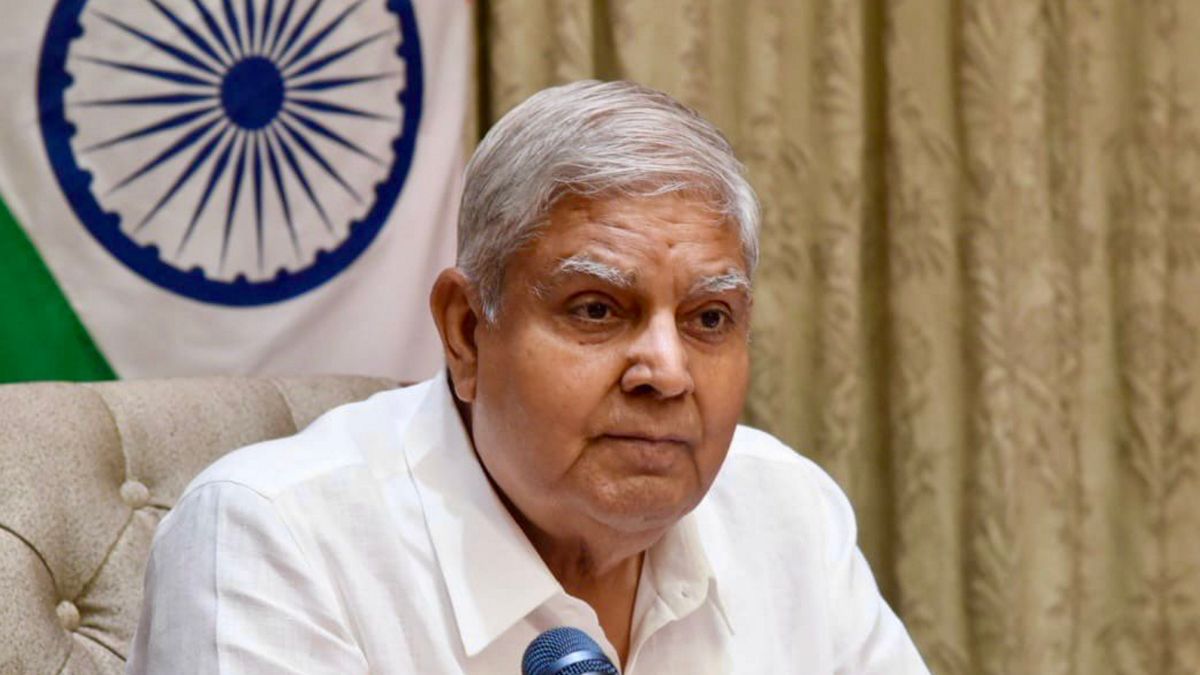Vice President Jagdeep Dhankhar has opposed a recent Supreme Court ruling that laid down timelines for the President to decide on Bills referred by the Governor. Comparing Article 142 of the Constitution to a “nuclear missile”, he claimed the provision is against democratic forces.
“There is a directive to the President by a recent judgment. Where are we heading? What is happening in the country?” VP Dhankhar said, addressing the 6th batch of Rajya Sabha interns at the Vice President’s Enclave on Thursday (April 17). He also called for amending Article 145(3), which says a bench of at least five judges should decide a case concerning a “substantial question of law”. But why?
Let’s take a closer look.
What did VP Dhankhar say?
VP Jagdeep Dhankhar strongly objected to the top court’s recent ruling setting deadlines for the President and Governors to sign Bills, slamming judges becoming a “super Parliament”.
“We never bargained for democracy for this day. [The] President being called upon to decide in a time-bound manner, and if not, becomes law. So we have judges who will legislate, who will perform executive functions, who will act as super-parliament, and absolutely have no accountability because the] law of the land does not apply to them,” he said, as per LiveLaw.
The VP, who is also the Chairman of Rajya Sabha, criticised Article 142, which, according to him, is being used against democracy. Dhankhar further pointed out that Article 145(3) states that a key constitutional issue has to be decided by a bench of at least five judges. However, the recent judgement involving the President was delivered by a two-judge bench.
Calling for an amendment to Article 145(3), he said there is a need to raise the number of minimum judges in a Constitution bench.
तो क्या हम ऐसे हालात में आ गए कि समय के साथ यह बात चली जाएगी? लोगों के दिल पर इस घटना से गहरी चोट लगी है, लोगों का विश्वास डगमगा गया है।
— Vice-President of India (@VPIndia) April 17, 2025
There was a survey conducted recently by a media house that indicated that public confidence in the institution of Judiciary is dwindling.
It… pic.twitter.com/DjuCS8WYTL
“We cannot have a situation where you direct the President of India and on what basis? The only right you have under the Constitution is to interpret the Constitution under Article 145(3). There, it has to be five judges or more… Article 142, Article 142 has become a nuclear missile against democratic forces, available to the judiciary 24x7”, he added.
Dhankhar also brought up the case of Justice Yashwant Varma , the then-sitting judge of the Delhi High Court, who came to the spotlight last month after wads of cash were allegedly found at his official residence in the national capital.
The Vice President flagged that no FIR has been filed yet after the alleged cash haul, adding that the judges’ panel has also not disclosed the findings of its inquiry. “It is now over a month. Even if it is a can of worms. Even if there are skeletons in the cupboard, time to blow up the can. Time for its lid to go out. And time for the cupboard to collapse. Let the worms and skeletons be in the public domain so that cleansing takes place,” he said.
What’s Article 142?
Article 142 of the Constitution empowers the Supreme Court to pass any decree or order required for ‘complete justice’ in a case.
“The Supreme Court in the exercise of its jurisdiction may pass such decree or make such order as is necessary for doing complete justice in any cause or matter pending before it, and any decree so passed or order so made shall be enforceable throughout the territory of India in such manner as may be prescribed by or under any law made by Parliament and, until provision in that behalf is so made, in such manner as the President may by order prescribe,” it states.
The provision also enables the apex court to “make any order for the purpose of securing the attendance of any person, the discovery or production of any documents, or the investigation or punishment of any contempt of itself.”
What was the SC ruling?
In a landmark judgement on April 8, the Supreme Court deemed Tamil Nadu Governor RN Ravi withholding assent to 10 state bills as “illegal” and “unconstitutional”.
A bench of Justices JB Pardiwala and R Mahadevan was hearing a writ petition filed by the DMK-led Tamil Nadu government challenging the Governor’s repeated delays and refusal to assent to these bills.
The top court laid down guidelines for Governors as well as the President on the clearing of bills. It ruled that Governors are constitutionally bound to act “expeditiously” on bills and cannot withhold assent or reserve Bills for the President’s consideration after sending them back once.
The apex court also set a deadline of three months for the President to decide whether to assent to Bills referred by the Governor.
Invoking Article 143, the top court said that the President “ought to” seek its opinion if a bill is reserved on grounds of unconstitutionality.
It also admitted that it is not compulsory for a legislation to be referred to the court. The SC added that the same “holds high persuasive value and should ordinarily be accepted by the legislature and the executive” and “merely because the jurisdiction under Article 143 is not binding does not undermine the principles used by this Court to determine the constitutionality of the bill.”
“We are of the considered view that although the option to refer a Bill to this Court under Article 143 may not be mandatory, yet the President, as a measure of prudence, ought to seek an opinion under the said provision in respect of Bills that have been reserved for the consideration of the President on grounds of perceived unconstitutionality.”
With inputs from agencies


)

)
)
)
)
)
)
)
)



